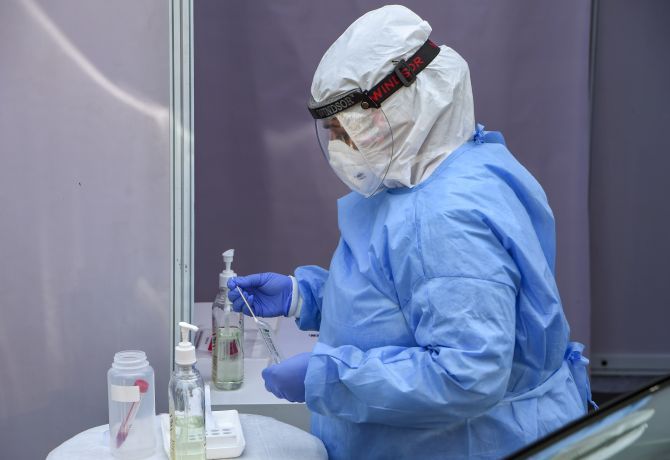 | « Back to article | Print this article |
'There is indeed a link between BCG vaccination and resistance to COVID-19.'

Last week, the New York Institute of Technology issued a study stating that the 100-year-old BCG (Bacillus Calmette-Guerin) vaccine could be a 'game-changer' in the fight against coronavirus.
The BCG vaccine, that was developed in Europe to fight TB, is still used in the developing world.
Scientists discovered that countries that did not have a BCG vaccination policy saw 10 times more incidence of mortality from coronavirus.
Doctors in Melbourne, Australia, have started administering the BCG vaccine to physicians, nurses, respiratory therapists and other healthcare workers.
The director of immunobiology at the Massachusetts General Hospital in Boston is asking for funding to commence a clinical trial of the vaccine among healthcare workers.
It is against this background that Rediff.com's Shobha Warrier spoke to the well-known immunologist Dr Gobardhan Das, a professor at the Special Centre of Molecular Medicine at Jawaharlal Nehru University. He is also an adjunct professor, pathology and genomic medicine at the Houston Methodist Hospital, USA.
Dr Das has been requesting the authorities at the health ministry through his Twitter handle for more than a month to start once again immunising India's health workers and the elderly with the BCG vaccine.
"I believe that in India, not only micro bacteria-like organisms, we are often exposed to environmental micro bacteria. So, we are far more resistant to infections like COVID-19," Dr Das, below, says in the first of a two-part interview:
Some of the studies show that countries that had given BCG vaccine to children -- like Brazil, India, Japan, etc -- have shown fewer COVID-19 infected cases and low mortality rate compared to the countries that no longer use the BCG vaccine, like the US and the European countries.
Do you think there is a direct link between the BCG vaccine and resistance to the coronavirus?
Yes. In my opinion, there is indeed a link between BCG vaccination and resistance to COVID-19.
I believe that in India, not only micro bacteria-like organisms, we are often exposed to environmental micro bacteria. So, we are far more resistant to infections like COVID-19.
You take Spain, which has 125,000 infected cases while neighbouring Portugal has only 11,000 cases.
While in Portugal, the BCG vaccine is administered, it is not in Spain.
In Brazil, where BCG vaccination started in 1920, there are only around 11,000 infections.
Japan, which started BCG vaccination in 1947, has 3,500 infected people.
Iran that started the BCG vaccine in 1984, has 58,000 cases.
That's why I say there is a direct co-relation between the incidence of COVID-19 and the BCG vaccination.
BCG vaccination is against a bacterial infection and this is a virus. How does a vaccination that is for bacterial infection work for against a virus?
BCG is nothing but a micro bacterial strain. Immunologists call it adjuvant which is used to facilitate hyper immune responses. In adjuvant, often micro bacterial parts are used, and it is the best adjuvant.
Because of the micro bacteria, our immune response is always higher than those who are not exposed to the micro bacterial antigens.
For example, in the US, they are not vaccinated with any micro bacteria, and the incidence of getting exposed to any micro bacteria is also much less.
Therefore, their immune response is lesser than that of Indians.
You mean, it is not about bacteria or the virus, but about the general immune system?
That is correct. Also, when you immunise with BCG, in immunological terms you get something called Trained Immunity or we call it 'Immunological memory' which lasts long.
When you immunise with BCG to protect against TB, it actually protects against so many other infections. For example, leprosy.
We still do not know the exact mechanism, but this vaccine actually protects against various other infections too.
Scientifically speaking, how does the BCG vaccine work against the coronavirus?
There are two points I have to say. One is, our immune response is higher than many other people. Because our immune response is high, it helps in our response to the virus.
Secondly, because of the BCG vaccine and the adjuvant effect, the moment any virus or any antigen comes in, the trained immunity we have, can eliminate them effectively.
We have been administering the BCG vaccine from 1947 onwards. So, do you feel it is due to the BCG vaccine that India has fewer infected cases and low mortality rate?
Yes. In India, there are three factors that are working in our favour.
First is the early lockdown which the rest of the world failed to do, has had a huge impact.
Second is the human immune response which is already high because of the exposure to various micro bacterial organisms.
If you compare our immune response to that of those from the so-called clean countries, there is always a difference.
This basic immune response of ours is actually favouring us. We are much more resistant to infections than our western counterparts.
Third factor that is helping us is the BCG vaccine that we have been given as children.
So, relatively speaking, we are safer than countries like the US, Italy, Spain, etc.
But you have to remember that it does not mean we do not have to adhere to the precautions. We have to strictly practice social distancing, washing hands, etc.
Does that mean it is better to be living in a less sanitised world so that the immune system will be more resistant to infections?
We often talk about something called the hygiene versus non-hygiene theory. Non-hygiene means living in an environment where you are exposed to various organisms. Among such people, the immune system is strong. Yes, in one way, it is good.
That's why the number of allergy cases in the US and other such countries is higher but infections are much less because there are fewer organisms around.

But in India, despite the fact we are exposed to hundreds of organisms every day, we do not contract diseases that easily. Does that mean you should be living in an atmosphere where you can acquire stronger immune system?
My personal view is that living in non-hygienic conditions and thereby having a better immune system, may protect you from various infections.
However, to have heightened immune response always is not good because it affects the inflammatory response.
Because of the unhygienic conditions, your inflammatory response will not be good, and that can damage your organs.
The after-effect will be, life expectancy may come down. So, this is the flip side of living in unhygienic conditions.